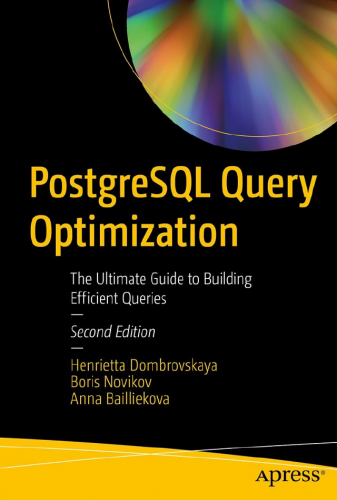1 Year of Service
56%

Write optimized queries. This book helps you write queries that perform fast and deliver results on time. You will learn that query optimization is not a dark art practiced by a small, secretive cabal of sorcerers. Any motivated professional can learn to write efficient queries from the get-go and capably optimize existing queries. You will learn to look at the process of writing a query from the database engine’s point of view, and know how to think like the database optimizer.
The book begins with a discussion of what a performant system is and progresses to measuring performance and setting performance goals. It introduces different classes of queries and optimization techniques suitable to each, such as the use of indexes and specific join algorithms. You will learn to read and understand query execution plans along with techniques for influencing those plans for better performance. The book also covers advanced topics such as the use of functions and procedures, dynamic SQL, and generated queries. All of these techniques are then used together to produce performant applications, avoiding the pitfalls of object-relational mappers.
This second edition includes new examples using Postgres 15 and the newest version of the PostgresAir database. It includes additional details and clarifications about advanced topics, and covers configuration parameters in greater depth. Finally, it makes use of advancements in NORM, using automatically generated functions.
What You Will Learn:
- Identify optimization goals in OLTP and OLAP systems
- Read and understand PostgreSQL execution plans
- Distinguish between short queries and long queries
- Choose the right optimization technique for each query type
- Identify indexes that will improve query performance
- Optimize full table scans
- Avoid the pitfalls of object-relational mapping systems
- Optimize the entire application rather than just database queries
The book begins with a discussion of what a performant system is and progresses to measuring performance and setting performance goals. It introduces different classes of queries and optimization techniques suitable to each, such as the use of indexes and specific join algorithms. You will learn to read and understand query execution plans along with techniques for influencing those plans for better performance. The book also covers advanced topics such as the use of functions and procedures, dynamic SQL, and generated queries. All of these techniques are then used together to produce performant applications, avoiding the pitfalls of object-relational mappers.
This second edition includes new examples using Postgres 15 and the newest version of the PostgresAir database. It includes additional details and clarifications about advanced topics, and covers configuration parameters in greater depth. Finally, it makes use of advancements in NORM, using automatically generated functions.
What You Will Learn:
- Identify optimization goals in OLTP and OLAP systems
- Read and understand PostgreSQL execution plans
- Distinguish between short queries and long queries
- Choose the right optimization technique for each query type
- Identify indexes that will improve query performance
- Optimize full table scans
- Avoid the pitfalls of object-relational mapping systems
- Optimize the entire application rather than just database queries
To see this hidden content, you must like this content.